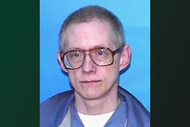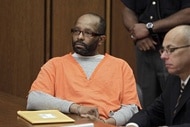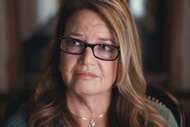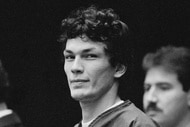Create a free profile to get unlimited access to exclusive videos, breaking news, sweepstakes, and more!
Who Told Ted Bundy He Was 'Extremely Wicked, Shockingly Evil And Vile?'
Spoiler: The person who said this infamous phrase (now the title of a Zac Efron movie about Ted Bundy) also seemed to have been charmed by the serial killer.

The Ted Bundy biopic “Extremely Wicked, Shockingly Evil and Vile,” which screened at the Tribeca Film Festival on Thursday and will become available on Friday on Netflix and stars Zac Efron and Lily Collins has certainly been generating a lot of buzz. The title of the film definitely sums up Bundy’s personality — he did admit to killing more than 30 women, after all, and have sex with many of their corpses, sometimes days after he killed them. And he later had the audacity to not only represent himself in court, but to also blame pornography for his crime spree.
So, the title of the movie fits the man. But the movie title isn't just a string of fitting adjectives. It comes from something that was said to the killer when he was still alive, as documented in the Netflix docuseries, “Conversations with A Killer: The Ted Bundy Tapes,” released over the winter.
The judge during Ted Bundy's first murder trial in 1979, Judge Edward Cowart (played in the movie by John Malkovich), made the now-iconic statement before he sentenced Bundy to death. It would mark the first of three times the serial killer was sentenced to death.
Was he referring to Bundy himself?
No. Just his crimes.
The murder trial operated much like a media circus as the Miami courtroom was filled with "beautiful women" nicknamed "Ted Groupies," according to Ann Rule's true crime book “The Stranger Beside Me: The True Crime Story of Ted Bundy.” Bundy, a law school drop out, decided to represent himself. During at least one part of the pre-trial, he acted as the defendant, the defense attorney and then a witness.
His law school experience, and the confidence he exuded during the trial, wasn't enough to get him off the hook for the murders. On July 23, 1979, Bundy was found guilty. A few days later, on July 28, a jury decided his punishment should be death.
Then, on July 31, after Bundy attempted to plead with the judge to have his life spared, Cowart responded with the statement, “The court finds that both of these killings were indeed heinous, atrocious, and cruel and that they were extremely wicked, shockingly evil, vile, and the product of a design to inflict a high degree of pain and utter indifference to human life."
He ordered Bundy to be killed by electric chair.
Those two killings mentioned by the judge referenced the murder of two female students at Florida State University. Both women — Margaret Bowman and Lisa Levy — were bludgeoned to death in their sorority house during the early morning hours of Jan. 15, 1978.
“They were all beaten with like a big chunk of firewood, and beaten to death in their beds," Brent Kallestad, who used to write for the Associated Press, later recalled to WFSU, a public radio station owned by the school. "There’s an irony about it too because there were probably at least 30 other women asleep or at least in the area and somehow he managed to do this quietly enough that nobody heard their screams.”
Cowart seemed disgusted by these crimes — but he also appeared to be taken by some of Bundy’s charm and he clearly thought he had potential to be a real lawyer.
After sentencing him to death, Cowart told Bundy, "It is an utter tragedy for this court to see such a total waste of humanity as I’ve experienced in this courtroom. You’re a bright young man. You’d have made a good lawyer and I would have loved to have you practice in front of me, but you went another way, partner. Take care of yourself. I don’t feel any animosity toward you. I want you to know that. Once again, take care of yourself."
A year later, during the 1980 murder trial for the 1978 rape and killing of 12-year-old Kimberly Diane Leach, Bundy got married in the courtroom to Carole Ann Boone, taking advantage of an obscure Florida law that said a marriage declaration in front of a judge counted as a marriage. At the end of the trial, it took the jurors just 45 minutes of deliberation to decide, once again, that Bundy must die.
He was executed on Jan. 24, 1989. He was 42 years old.
[Photo: Netflix]


























